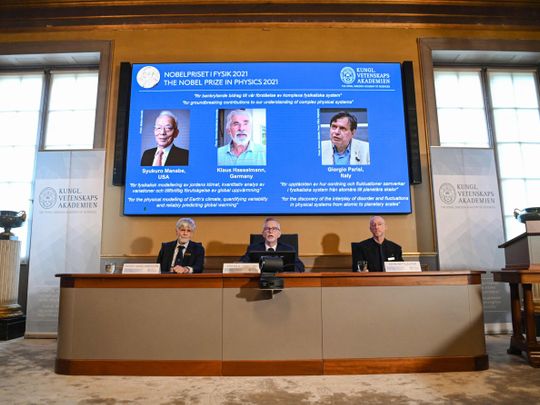
STOCKHOLM: Syukuro Manabe of the US and Japan, Klaus Hasselmann of Germany and Giorgio Parisi of Italy, on Tuesday won the Nobel Physics Prize for climate models and the understanding of physical systems, the jury said.
“Syukuro Manabe and Klaus Hasselmann laid the foundation of our knowledge of the Earth’s climate and how humanity influences it. Giorgio Parisi is rewarded for his revolutionary contributions to the theory of disordered materials and random processes,” the jury said.
Manabe, 90, has US citizenship. Parisi is Italian and Hasselmann is German.
The prestigious prize is worth 10 million Swedish crowns ($1.15 million).
Starting in the 1960s, Manabe demonstrated how increases in the amount of carbon dioxide in the atmosphere would raise global surface temperatures, laying the foundations for current climate models.
About a decade later, Hasselmann created a model that helped explain why climate models can be reliable despite the seemingly chaotic nature of the weather. He also developed ways to look for specific signs of human influence on the climate.
Parisi “built a deep physical and mathematical model’’ that made it possible to understand complex systems in fields as different as mathematics, biology, neuroscience and machine learning.
His work originally focused on so-called spin glass, a type of metal alloy in which the atoms are arranged in a way that changes the material’s magnetic properties in apparently random ways that baffled scientists. Parisi, 73, was able to discover hidden patterns that explained this behavior, theories that could be applied to other fields of research, too.
In their work, the physicists used complex mathematics to explain and predict what seemed like chaotic forces of nature in computer simulations, called modeling. That modeling has given scientists such a solid understanding of those forces that they can accurately predict weather a week out and warn about the climate decades in advance.
Some non-scientists have attacked and ridiculed modeling, but it has been key to the way the world tackles one of its biggest problems: climate change.
“Physics-based climate models made it possible to predict the amount and pace of global warming, including some of the consequences like risings seas, increased extreme rainfall events and stronger hurricanes, decades before they could be observed. Klaus Hasselmann and Suki Manabe were pioneers in this area and personal role models for me,’’ said German climate scientist and modeler Stefan Rahmstorf.
“We now witnessing how their early predictions are coming true one after the other,’’ Rahmstorf said.
When climate scientists and former U.S. Vice President Al Gore won the 2007 Nobel Peace Prize, some non-scientists who deny global warming dismissed it as a political prize. Perhaps anticipating controversy, officials who spoke at the announcement emphasized that Tuesday’s was a science prize.
“It’s a physics prize. What we are saying is that the modeling of climate is solidly based on physical theory and well known physics,’’ said Swedish physicist Thors Hans Hansson at the announcement.
While Parisi’s work was not focused on climate, he spoke to the pressing problems facing the Earth after the announcement.
“It’s very urgent that we take very strong decisions and move at a very strong pace’’ in tackling global warming, he said. ``It’s clear for future generations that we have to act now.’’
Asked whether he expected to get the prize, Parisi said: “I knew there was a non-negligible possibility.’’
COVID-19 restrictions in Italy meant “we cannot have a very big celebration,’’ he said. “I think we will do something but we are not really decided.’’
The Nobel prizes were created in the will of Swedish dynamite inventor and businessman Alfred Nobel and have been awarded since 1901 with only a handful of interruptions, primarily due to the two world wars.
As last year, there will be no banquet in Stockholm because of the COVID-19 pandemic. The laureates will receive their medals and diplomas in their home countries.
The physics prize announcement will be followed in coming days by the awards for chemistry, literature, peace and economics.
Among the Nobels, physics has often taken centre stage, with awards often going to major breakthroughs in our understanding of the universe. Previous winners include Albert Einstein and the husband-and-wife team of Pierre Curie and Marie Curie.
Last year, scientists Roger Penrose, Reinhard Genzel and Andrea Ghez won the Nobel physics prize for their discoveries concerning black holes.








